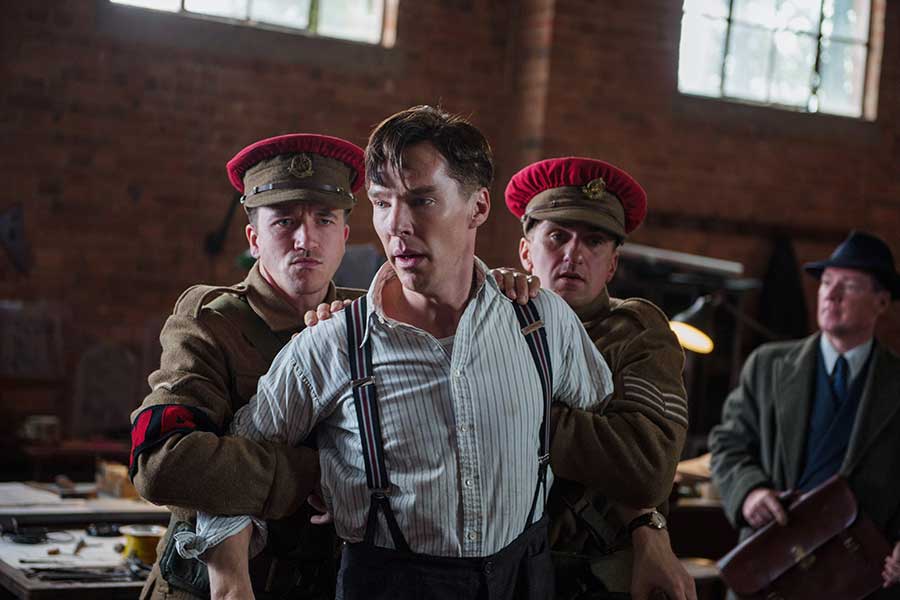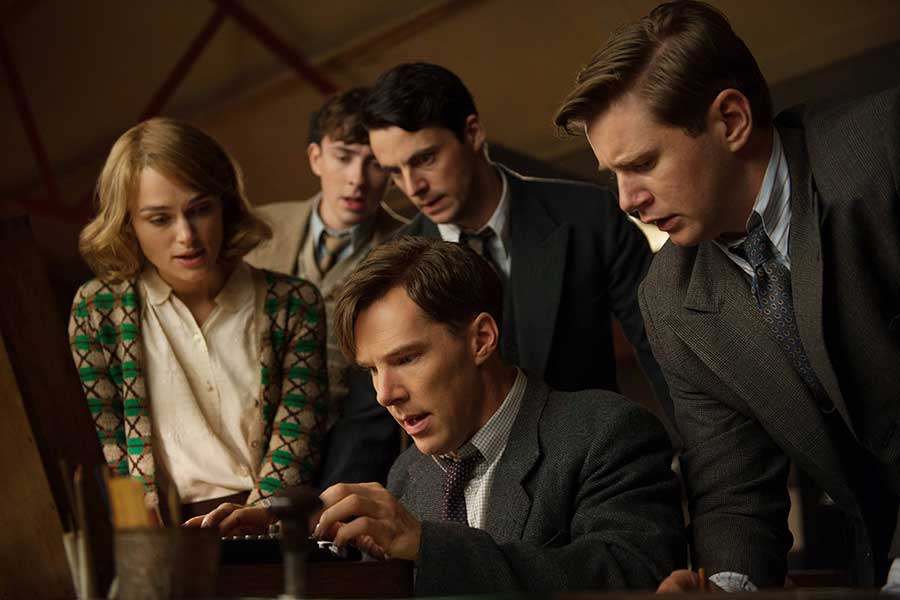Based on a true story, “The Imitation Game” is a slick but highly satisfying crowd-pleaser about the remarkable Alan Turing (Benedict Cumberbatch). The film, which opens Christmas Day at Ritz Theaters, chronicles three distinct periods in the life of this great gay man who is famous for cracking the Nazi Enigma machine and saving an estimated 14-million lives during World War II.
A pre-credit sequence features Detective Nock (Rory Kinnear) interrogating Turing, who has been arrested on charges of gross indecency. Turing recounts his efforts doing code-breaking work during the war at Bletchley Park to Nock, which forms the spine of the film. Periodically, the film flashes backs to Alan’s childhood, which depicts him learning cryptography and falling in love with his fellow student, Christopher (Jack Bannon).
“The Imitation Game” is very clear on showing how Turing, a mathematician and logician, has a great mind but very few social skills. An early scene where Commander Denniston (Charles Dance) interviews Alan for a top-secret job at Bletchley Park illustrates just how literal — and how brilliant — Turing was. Alan claims that, while he is no good at German, he knows how to do crossword puzzles, and that should qualify him for the work at hand. Denniston is exasperated, but audiences will be amused and squarely on Turing’s side.
The mathematician’s quirky behavior extends to how he (mis)treats his colleagues, Hugh Alexander (Matthew Goode) and John Cairncross (Allen Leech), among them. They find Turing insufferable, even if they respect his talents. They even support his instincts and efforts to build a machine — a computer — to help crack the Enigma machine despite Denniston’s reluctance.
But just as Alan hopes to break the Enigma, the film constantly shows him being broken down. A traumatic episode of abuse from his childhood emphasizes that Alan was beaten up for being “different.” Scenes during wartime have Alan under pressure to prove his expensive machine works. In addition, when he confesses to being a homosexual to a Bletchley Park colleague, his secret cannot be spread because being gay was illegal at the time. In the post-war sequences, when Alan had been chemically castrated — his punishment for “gross indecency” — he becomes a shadow of his former self. These scenes are particularly sad moments that show how the once-great mind was undone simply because he was queer.
Significantly, “The Imitation Game” discusses Alan’s sexuality without ever showing it. This lack of physical same-sex intimacy may be an effort to make his story play to mainstream audiences, but it really does not hurt the film. Even if Alan has been arrested for “trying to entice another man to touch his penis,” it is not necessary to show that activity to get the point across.
What is important is presenting the man behind the machine, which the film does beautifully. When Alan hires Joan Clarke (Keira Knightley) to assist in his efforts at Bletchley Park, a deep friendship — not unlike the one he had with Christopher — develops. He coaxes her to come work with him; she helps him become a bit more likable with his colleagues. The scenes of Alan and Joan together are terrific, and show some of the humanity underneath this very-scientific logician. Their reunion, years after the war had ended, is both powerful and incredibly poignant.

Cumberbatch as Turing being restrained in the movie
“The Imitation Game” benefits greatly from Cumberbatch’s Oscar-worthy performance. The actor, who may be best-known for playing that other brainiac, Sherlock Holmes, gets Alan’s stammers and tics right. His performance never comes across as mannered even when Alan is being most irritating. Likewise, Knightley is superb as Joan, a woman who breaks into a man’s world, and has to continue to prove herself worthy of their company. A fight Joan has with Alan is one of the film’s best moments.
If this glossy drama has a weakness, it is for being heavy-handed at times. The syrupy music by Alexandre Desplat tends to overemphasize what audiences should feel at a particular moment. Likewise, periodic cutaways to soldiers — often wounded ones — are used to remind viewers of human lives at stake. These elements feel manipulative, as if the filmmakers, director Morten Tyldum and screenwriter Graham Moore (adapting Andrew Hodges’ book, “Alan Turing: The Engima”), don’t trust the audience to put some of the obvious pieces together.
While “The Imitation Game” crackles with the code-breaking scenes — the film’s big, important moments are indeed thrilling — less exciting is an episode involving intrigue and blackmail following the discovery of a spy inside Bletchley Park. The film could have done more with its conspiracy-of-lies subplot.
Yet these are minor flaws in a fabulous film that emphasizes the tremendous achievements of Alan Turing.

